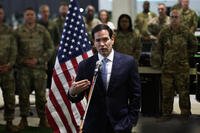The readiness and maintenance of the nation's nuclear triad deterrent has been unaffected thus far by the coronavirus outbreak, although an unspecified number of military personnel are in self-quarantine as a precaution, the head of U.S. Strategic Command said Tuesday.
"We don't have any confirmed cases of COVID-19," the disease caused by coronavirus, said Adm. Charles A. "Chas" Richard, commander of STRATCOM, but "less than 10" personnel at STRATCOM headquarters are in self-quarantine.
He was vague regarding the reasons for the self-quarantine, but said it was a precautionary move, possibly because the personnel may have recently returned from travel.
Fewer than 20 personnel from the Air Force component of STRATCOM and fewer than 20 from the Navy component are also in self-quarantine, Richard said at a Pentagon video briefing from STRATCOM headquarters at Offutt Air Force Base in Nebraska. Again, he was vague on the reasons.
Related: The Military's Coronavirus Cases: The Latest Rundown
Richard said that STRATCOM medical personnel had tests available for coronavirus, but did not say whether the tests came from within the military supply chain or the civilian sector.
"I am a customer of the Department of Defense's medical establishment. We have had no issues in any respect," he added.
He also declined to be specific on how the coronavirus epidemic might affect the "missileers" who normally work 24-hour shifts in the missile silos and would be called upon to launch in a national emergency.
"My organization is designed to be able to operate isolated for long periods of time," Richard said. "[But] it's best not to go into specific detail on how we're accomplishing that."
The main point Richard stressed at the briefing was the readiness of the nuclear triad of intercontinental ballistic missiles, strategic bombers and ballistic submarines, which he said is unaffected by the coronavirus epidemic.
The nation's nuclear forces "remain ready to execute" despite the coronavirus outbreak, and the pandemic has had "no impact to our ability" to carry out missions, Richard said.
He did not respond to a final question on whether the coronavirus epidemic would impact the Defense Department's plan to modernize the nation's nuclear deterrent, estimated by the Congressional Budget Office to cost $494 billion through 2028.
It was unclear whether there were communications problems with the video conference, but Pentagon officials said they would try to get an answer to the question later.
In a statement later, Capt. William Clinton, public affairs chief at STRATCOM, said, “we are confident the services, along with industry partners, are able to keep production related to modernization of our nuclear forces on track, while taking appropriate precautions to keep their work forces safe and healthy.”
-- Richard Sisk can be reached at Richard.Sisk@military.com.
Read More: These 2 Futuristic Aircraft Will Compete to Replace the Army's Black Hawk





























